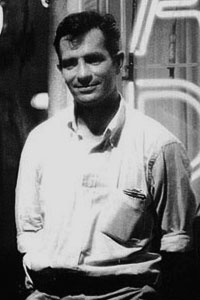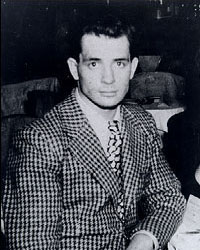
Photographer Unknown

Photographer Unknown
Erowid Character Vaults
Jack Kerouac
Mar 12, 1922 - Oct 21, 1969
Summary
Writer Jack Kerouac was born Jean-Louis Kerouac to French-Canadian parents in Massachusetts. He was a storyteller even as a child, but interestingly entered Columbia University on a football scholarship. He eventually dropped out of Columbia and in 1943 he joined the Navy. His stint in the Marines was also a short one; after a month, he walked off the training field. He returned to New York where he hung out with friends Allen Ginsberg, William Burroughs, and Neal Cassady, writing, taking odd jobs, and working as a merchant seaman. It was this crew that prompted him to create the phrase "The Beat Generation".
In 1944 Kerouac was arrested as an accessory to the murder of David Kammerer by Lucien Carr. He married his first wife, Eddie Parker, while in jail. The marriage lasted only a short time, and he would later go through another unsuccessful marriage to Joan Haverty. He lived in New York for many years, where he wrote most of his novels. But increasing problems with alcoholism caught up with him while visiting Big Sur, California leading to one of his better-known novels by the same title. After his nervous breakdown he returned to New York where he hoped his mother, with whom he had always been close, would help care for him. In 1966 Jack's mother suffered a stroke and he married childhood friend Stella Sampas. Stella helped care for his mother and together they moved to Florida. Kerouac died at the age of 47.
In 1944 Kerouac was arrested as an accessory to the murder of David Kammerer by Lucien Carr. He married his first wife, Eddie Parker, while in jail. The marriage lasted only a short time, and he would later go through another unsuccessful marriage to Joan Haverty. He lived in New York for many years, where he wrote most of his novels. But increasing problems with alcoholism caught up with him while visiting Big Sur, California leading to one of his better-known novels by the same title. After his nervous breakdown he returned to New York where he hoped his mother, with whom he had always been close, would help care for him. In 1966 Jack's mother suffered a stroke and he married childhood friend Stella Sampas. Stella helped care for his mother and together they moved to Florida. Kerouac died at the age of 47.
Author of (Books)

